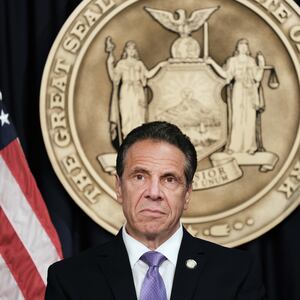Nine minutes before noon on Tuesday, the Senate passed a $1.2 trillion infrastructure bill, handing President Joe Biden a massive political victory and proof that his longstanding faith in bipartisan cooperation could still yield actual results.
Sixteen minutes later, Gov. Andrew Cuomo of New York announced his impending resignation, the political equivalent of driving a ride-on mower through your father’s barbecue, rendering the feast no longer “good.”
The governor’s announcement that he was resigning following the release of a damning report by the state’s attorney general that determined he had sexually harassed nearly a dozen women while in office—and the media pile-on that swiftly followed—irritated Democrats who had carefully choreographed a victory lap following the bipartisan passage of the biggest infrastructure bill in generations.
ADVERTISEMENT
A source familiar with the mood in the White House sniped that it was “fitting” that “a guy who made a global pandemic all about himself would Leeroy Jenkins the biggest investment in American infrastructure in a generation!”
Or, as a White House staffer texted: “Hahahaha… shocker.”
But the majority of the internal annoyance was directed at reporters who first chased Cuomo’s tennis ball into traffic and then, in the White House’s view, confused their own distraction with that of the American people.
“The American people across the country who are commuting back and forth to work, driving their kids to camp, worried about whether their kids have access to clean drinking water, focused on whether schools are going to have the resources they need are most focused on the fact that… 19 Republicans joined the Democratic caucus to take an important step forward,” White House press secretary Jen Psaki told reporters when asked if the president was miffed that Cuomo chose “Infrastructure Day” to announce his resignation. “That’s my bet in terms of what people are talking about at home.”
Another source familiar with the White House’s feelings had sharper words for reporters who, in their view, interpreted midday cable news coverage as a meaningful barometer of the national mood.
“Reporters’ biggest blind spot is that they project their own media consumption habits—and their gleeful misimpression that politics is all an entertaining game and it doesn’t impact real lives—onto the country writ large,” the source said pointedly.
But as much as White House operatives would like to believe that the general public is capable of paying attention to more than one news story at a time, the reality of the Cuomo resignation was that it kicked the infrastructure news off the front pages of many newspapers and A-blocks of many cable news shows. Instead of talking about how Biden and Democrats were finally able to accomplish their long-sought bipartisan win, The New York Times, Washington Post, USA Today and the Wall Street Journal—the four papers with the largest circulations in the United States—all led with the Cuomo resignation Tuesday afternoon.
Biden himself was succinct in his reaction to Cuomo’s resignation at an event intended to highlight the infrastructure bill’s passage, merely telling reporters that he respected Cuomo’s decision to step down.
And the president was not the only top Democrat seen to have been denied a richly deserved victory lap. The Cuomo resignation that Senate Majority Leader Chuck Schumer (D-NY) had called for finally came—immediately after the leader’s success in carefully managing the bipartisan bill’s path to passage.
“I’m sure it’s just coincidental, but Schumer can’t catch a break,” a Democratic aide said of Cuomo’s fellow New York Democrat. “He has the biggest bipartisan achievement of any majority leader in recent memory and his own governor eclipses the news cycle for resigning amidst a sex scandal.”
As numerous progressive figures in and out of New York publicly rejoiced or breathed private sighs of relief, there was one person who was conspicuously absent from Tuesday's celebration: the leader of the Republican Party, Donald Trump.
By Tuesday evening, the twice-impeached former president and his office had yet to blast out any statement knocking the Democratic governor. The lack of statement stood out to various Republican operatives, including some who have worked for Trump, because of the ex-president's willingness to release post-White House statements—both brief and protracted—haranguing his enemies, including commentators he's recently watched on Fox News.
Earlier on Tuesday, Trump did send out a written statement, but it was one thrashing a fellow Republican politician, Senate Minority Leader Mitch McConnell (R-KY), for helping get the bipartisan, Biden-backed infrastructure legislation through the Senate this week. The statement dubbed McConnell “the most overrated man in politics.”
When Rudy Giuliani, the former mayor of New York City and Trump attorney, mentioned Cuomo’s downfall on Tuesday afternoon, he too spent more energy going after the infrastructure bill and fellow Republicans than he did dinging Cuomo.
“Timing of Cuomo statement is vintage Andrew,” Giuliani tweeted. “It buries the Schumer-Pelosi celebration for sucking in questionable Republicans for the biggest increase in dependency payments falsely advertised as an infrastructure bill. Poetic justice!”
Since leaving office in late January, Trump has said little in public about Cuomo, who has been drowning in multiple high-profile scandals. That is starkly contrasted to so many other prominent GOP and conservative figures, who have consistently and enthusiastically condemned the once-rising star in the Democratic Party. Even when Trump has weighed in on Cuomo, as the former president did at a New York GOP fundraiser earlier this month, his criticisms have sounded comparatively docile.
“Cuomo has found himself in an interesting situation,” Trump said at the fundraiser, according to the New York Post, in a report that also mentioned how “Trump… did not delve deeply into Cuomo’s problems” while onstage.
One explanation for Trump’s restraint when it comes to Cuomo's current “situation” is that it closely mirrors the numerous sexual-assault and harassment allegations that were leveled at Trump, during the 2016 presidential campaign, as well as during his term in the White House.
During Trump’s time in office, the official, on-the-record position of the White House was that the many different female accusers were all lying or not telling the truth. The former president’s general antagonism toward the #MeToo movement has even led him to publicly defend some of his political foes, including Biden, when they have been accused of sexual misconduct.
One longtime associate of Trump’s told The Daily Beast that, in one instance in recent weeks, they tried to goad the ex-president into a conversation about Cuomo to see “how much he would make fun of” the governor—only to see Trump quickly change the subject and not take the bait.
“I did not get the sense that he felt comfortable talking too much about Andrew Cuomo,” this source recalled, particularly in the context of sexual-harassment accusations.










